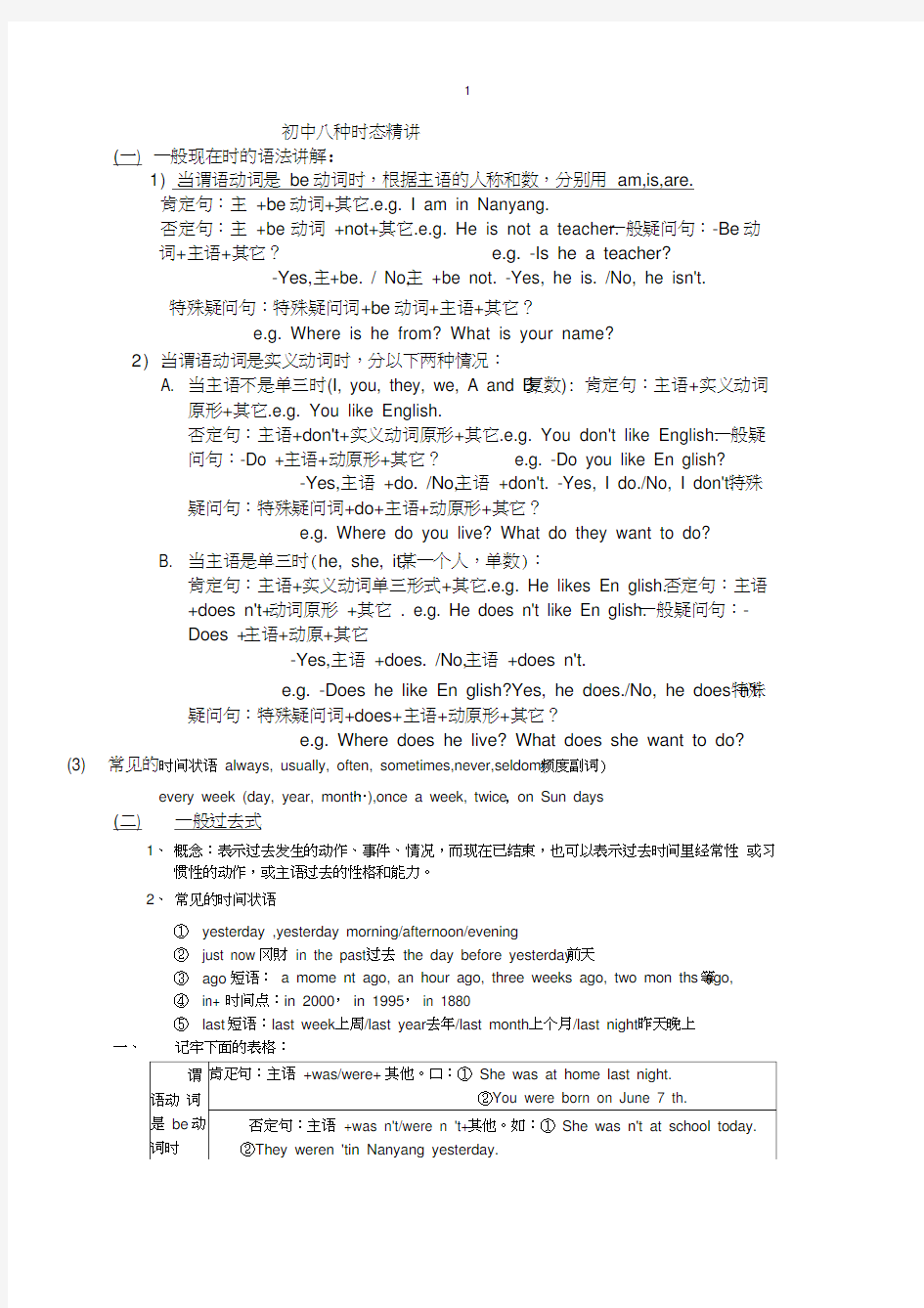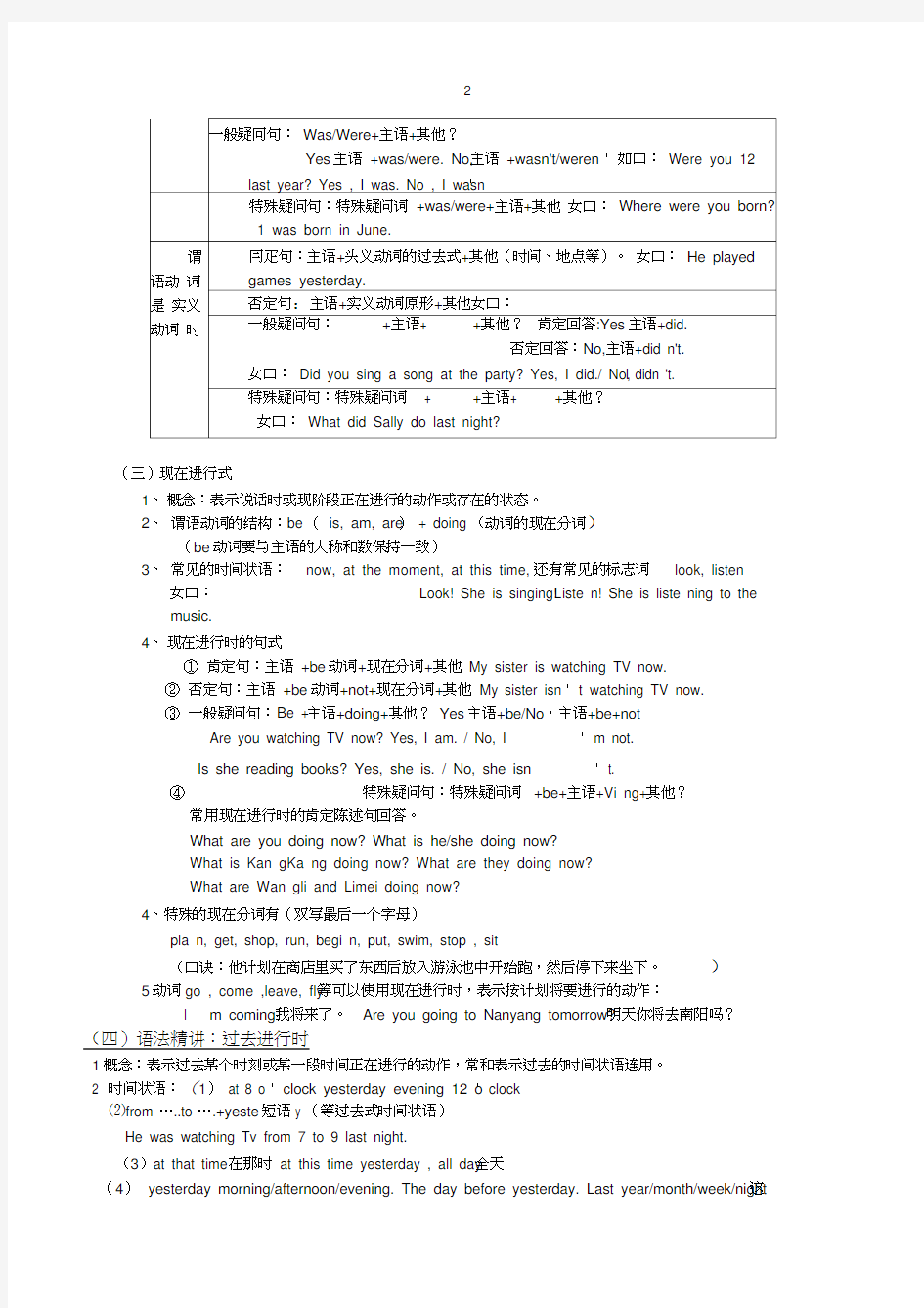

初中八种时态精讲
(一) 一般现在时的语法讲解:
1) .当谓语动词是be动词时,根据主语的人称和数,分别用am,is,are.
肯定句:主+be动词+其它.e.g. I am in Nanyang.
否定句:主+be 动词+not+其它.e.g. He is not a teacher. 一般疑问句:-Be动
词+主语+其它? e.g. -Is he a teacher?
-Yes,主+be. / No,主+be not. -Yes, he is. /No, he isn't.
特殊疑问句:特殊疑问词+be动词+主语+其它?
e.g. Where is he from? What is your name?
2) .当谓语动词是实义动词时,分以下两种情况:
A. 当主语不是单三时(I, you, they, we, A and B,复数): 肯定句:主语+实义动词
原形+其它.e.g. You like English.
否定句:主语+don't+实义动词原形+其它.e.g. You don't like English. 一般疑
问句:-Do +主语+动原形+其它? e.g. -Do you like En glish?
-Yes,主语+do. /No,主语+don't. -Yes, I do./No, I don't. 特殊疑问句:特殊疑问词+do+主语+动原形+其它?
e.g. Where do you live? What do they want to do?
B. 当主语是单三时(he, she, it,某一个人,单数):
肯定句:主语+实义动词单三形式+其它.e.g. He likes En glish. 否定句:主语
+does n't+动词原形+其它. e.g. He does n't like En glish. 一般疑问句:-
Does +主语+动原+其它
-Yes,主语+does. /No,主语+does n't.
e.g. -Does he like En glish?Yes, he does./No, he does n't. 特殊
疑问句:特殊疑问词+does+主语+动原形+其它?
e.g. Where does he live? What does she want to do?
(3) 常见的时间状语always, usually, often, sometimes,never,seldom( 频度副词)
every week (day, year, month …),once a week, twice , on Sun days
(二) 一般过去式
1、概念:表示过去发生的动作、事件、情况,而现在已结束,也可以表示过去时间里经常性或习
惯性的动作,或主语过去的性格和能力。
2、常见的时间状语
①yesterday ,yesterday morning/afternoon/evening
②just now 冈財in the past 过去the day before yesterday 前天
③ago 短语: a mome nt ago, an hour ago, three weeks ago, two mon ths ago, 等
④in+ 时间点:in 2000,in 1995,in 1880
⑤last短语:last week上周/last year去年/last month上个月/last night昨天晚上
一、记牢下面的表格:
(三)现在进行式
1、概念:表示说话时或现阶段正在进行的动作或存在的状态。
2、谓语动词的结构:be (is, am, are)+ doing (动词的现在分词)
(be动词要与主语的人称和数保持一致)
3、常见的时间状语:now, at the moment, at this time, 还有常见的标志词look, listen
女口:Look! She is singing! L iste n! She is liste ning to the
music.
4、现在进行时的句式
①肯定句:主语+be动词+现在分词+其他My sister is watching TV now.
②否定句:主语+be动词+not+现在分词+其他My sister isn ' t watching TV now.
③一般疑问句:B e +主语+doing+其他?Yes主语+be/No,主语+be+not
Are you watching TV now? Yes, I am. / No, I ' m not.
Is she reading books? Yes, she is. / No, she isn ' t.
④特殊疑问句:特殊疑问词+be+主语+Vi ng+其他?
常用现在进行时的肯定陈述句回答。
What are you doing now? What is he/she doing now?
What is Kan gKa ng doing now? What are they doing now?
What are Wan gli and Limei doing now?
4、特殊的现在分词有(双写最后一个字母)
pla n, get, shop, run, begi n, put, swim, stop , sit
(口诀:他计划在商店里买了东西后放入游泳池中开始跑,然后停下来坐下。)5动词go , come ,leave, fly等可以使用现在进行时,表示按计划将要进行的动作:
I ' m coming我将来了。Are you going to Nanyang tomorrow? 明天你将去南阳吗?(四)语法精讲:过去进行时
1概念:表示过去某个时刻或某一段时间正在进行的动作,常和表示过去的时间状语连用。
2 时间状语:(1)at 8 o ' clock yesterday evening 12 o ' clock
⑵from …..to ….+yeste短语y (等过去式时间状语)
He was watching Tv from 7 to 9 last night.
(3)at that time 在那时at this time yesterday , all day 全天
(4)yesterday morning/afternoon/evening. The day before yesterday. Last year/month/week/night 这
类时间状语既可以用于一般过去式,也可以用于过去进行时,要根据上下文情景判定谓语动词的时态,He was reading a novels last night(昨晚他一直在读)
He read a novel last night,(昨晚他看了一本小说)
用过去进行时强调动作进行的全过程,用一般过去式单纯说明动作完成的事实
3谓语动词的结构:was/were+v.ing(现在分词)
4过去进行时句子结构
(1)肯定句:主语+was/were +v.ing+其他。(2)否定句:主语+was/were+not+其他。
⑶一般疑问句:Was/were+ 主语+v.ing+ 其他?Yes主语+was/were No,主语+wasn' t/weren 't
(4)特殊疑问句:特殊疑问词+—般疑问句语序?
What were they play ing from 7 to 8 last ni ght?
5过去进行时常用与when,while引导的时间壮语从句中
We were play ing whe n our teacher came in.
(五)语法重点一般将来时
1、定义:表示将来某一时刻的动作或状态,或将来某一段时间内经常的动作或状态,常与将来的
时间状语连用。
2、表示将来的时间状语
(1)tomorrow,tomorrow morning/afternoon/evening (tomorrow 短语)
(2)next time,next work/weekend,next year/month/Sunday (next 短语)
(3)in 短语:in two minutes,in an hour 在一小时后,in two days 两天后
(4)soon 不久,later,in the future 将来
(5)tonight 今晚,this afternoon/evening ................ (还未发生的时间)
3、结构形式:
⑴be goi ng to+ 动词原型,表示计划、打算将来发生的动作
Eg:We are going to do some clea ning tomorrow.
He is going to go swim ming n ext week.
肯定句:主语+be goi ng to+ 动原型+其他......
一般疑问句:将be动词提前:Be+主语+going to+动原型+ 其他?
Yes, 主语+be/no.主语+be+not
否定句:主语+be+not+goi ng to + 动原型+其他......
Eg:Is Lucy going to go shopping this Sunday?Yes,she is./No,she isn ' t.
Lucy isn ' t going to go shopp ing this Sun day
(2)will+ 动词原形,表说话人对将来的看法,假设和推测
肯定句:主语+will+ 动原形+ 其它。Eg:He will go swimming next week.
否定句:主语+won' t+ 动原形+ 其它。Eg:He won' t go swimming next week.
疑问句:Will+ 主语+ 动原形+ 其它。Eg:Will he go swimming next week.
(3)Shall+ 动原形(主语只能是第一人称I , we)
肯定句:I/We+shall+动原形+其它。
否定句:I/We+shall not + 动原形+ 其它。
一般疑问句:Shall I/we go shopp ing tomorrow?
六)现在完成时:
1概念:过去发生或已经完成的动作对现在造成的影响或结果,或从过去已经开始,持续到现在的动作或状态。
时间状语:since …,for …,in/during the past few/two years, ever, yet, already, recently, over the years(几年来,这么多年来),主(现完)+sinee +从(一过),just (注意和just now的区别),so far, till now
2 基本结构:have/has + done 否定形式:have/has + not +done.
3 一般疑问句:have或has+主语+ done .
Helen ________ in Nanjing for twenty years。
(七)、过去完成时:
概念:以过去某个时间为标准,在此以前发生的动作或行为,或在过去某动作之前完成的行
为,即“过去的过去”。
时间状语:by the end of last year(term, mon th …),by+ 过去的时间,主(过完)+before+ 从(一过)基本结构:had + done.否定形式:had + not + done.
一般疑问句:had放于句首。
They _______ in Nanji ng by the end of last year.(be)
The pla ne __________ off before/whe n we got to the airport.(take)
八过去将来时
1概念:立足于过去某一时刻,从过去看将来,常用于宾语从句中。
2 时间状语:the next day(morning, year …)
3 基本结构:① was/were/going to + do :② would/should + do.
4 否定形式:① was/weren' t + going to + do;② would/should + not + do.
5 一般疑问句:①was或were放于句首;② would/should 提到句首。Helen said she
_______ to Shan ghai the n ext mon th.(fly)